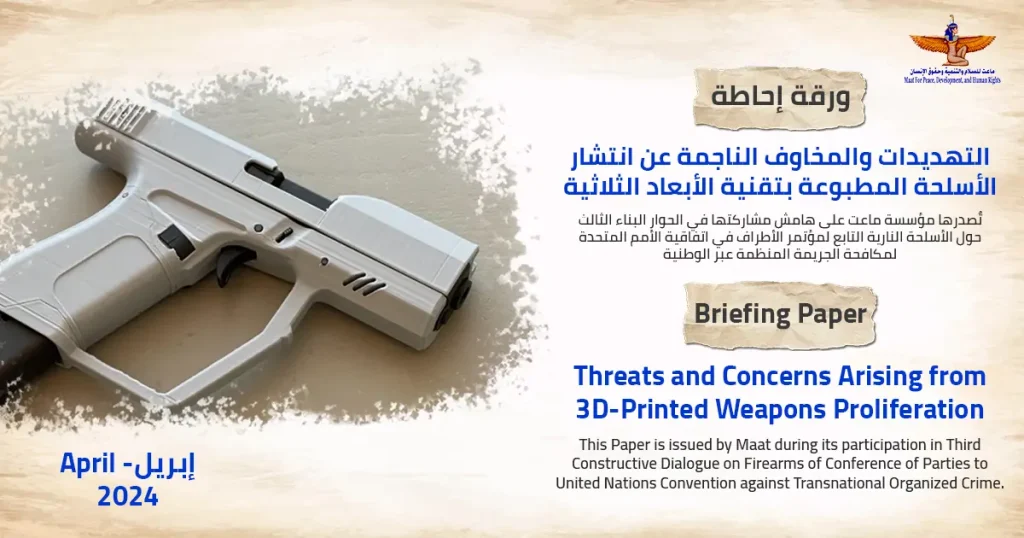Okeil: We recommendArab governments to Enhance Youth Involvement in Implementing National Strategies to Limit Climate Change
Imad: We Call on International and Regional Donors to Intensify their Financial Assistance to Countries Affected by Armed Conflicts
Maat for Peace, Development and Human Rights issued on Monday, September 4, 2023, the 19th issue of the SDG 13 Observatory in the Arab Region, entitled “Climate Change in the Arab Region... Youth in the Crosshairs,” in order to track the measures and practices by Arab countries to address climate change and its effects.
In the 19th issue of the SDG 13 Observatory, Maat discussed the efforts of the governments of Arab countries in strengthening the role of youth in confronting climate change, in light of the international community recognition of the importance of involving youth in environmental policy-making. UAE and Egypt were at the forefront of the countries that achieved successes throughout July; both countries adopted policies and activities that reduce carbon emissions on the long term. On the other hand, there are a number of countries for which efforts to limit climate change have not been mentioned, most notably Iraq, despite its classification as the 5th most vulnerable country in the world to climate change.
Djibouti was the country focus of the SDG 13 Observatory July’s issue; the country faces serious environmental problems that ranked it 130 out of 185 countries on the Notre Dame Global Adaptation Index. Despite the efforts made by the Djiboutian government, it is expected that the impacts will threaten regional climatic conditions coupled with rapid urbanization, increase poverty rates, cause a significant drop in agricultural productivity, affect food security and livelihoods, strain water resources, expand the geographic range of diseases, and lead to land degradation and destruction of infrastructure if the country did not accelerate the implementation of its strategic climate change plan.
 Commenting on the report, Ayman Okeil, a human rights expert and Chairman of Maat, said that Arab governments still have to take more important steps to address climate change, especially in conflict-affected countries such as Sudan and Eritrea, which are torn by the negative repercussions of climate change, in light of lack of state efforts to advance climate action due to ongoing armed conflict. Okeil pointed to the role of Arab youth in assuming climate leadership motivated by a desire to participate meaningfully in climate action, as they can adopt a variety of roles in government, academia, civil society, media, and private sector to respond to humanity’s greatest threats.
Commenting on the report, Ayman Okeil, a human rights expert and Chairman of Maat, said that Arab governments still have to take more important steps to address climate change, especially in conflict-affected countries such as Sudan and Eritrea, which are torn by the negative repercussions of climate change, in light of lack of state efforts to advance climate action due to ongoing armed conflict. Okeil pointed to the role of Arab youth in assuming climate leadership motivated by a desire to participate meaningfully in climate action, as they can adopt a variety of roles in government, academia, civil society, media, and private sector to respond to humanity’s greatest threats.
In this context, the human rights expert recommended the governments of Arab countries to enhance the involvement of youth in implementing national strategies to reduce climate change, and encourage youth projects and organizations that work to adapt to climate change. Okeil called on the UAE’s Ministry of Climate Change and Environment, to integrate Arab youth in COP28-related workshops and panel discussions, so that they exchange experiences and each other to support the efforts of less proactive governments.
For her part, Huda Imad, a researcher at the Sustainable Development Unit at Maat, stressed the importance of grants and financial assistance necessary to mitigate losses and damages resulting from climate change. She called on international and regional donors to intensify their financial assistance to Arab countries, especially the countries most vulnerable to climate risks, topped by Iraq and the conflict countries that lack the presence of strong institutions capable of financing harms.

 |
 |











